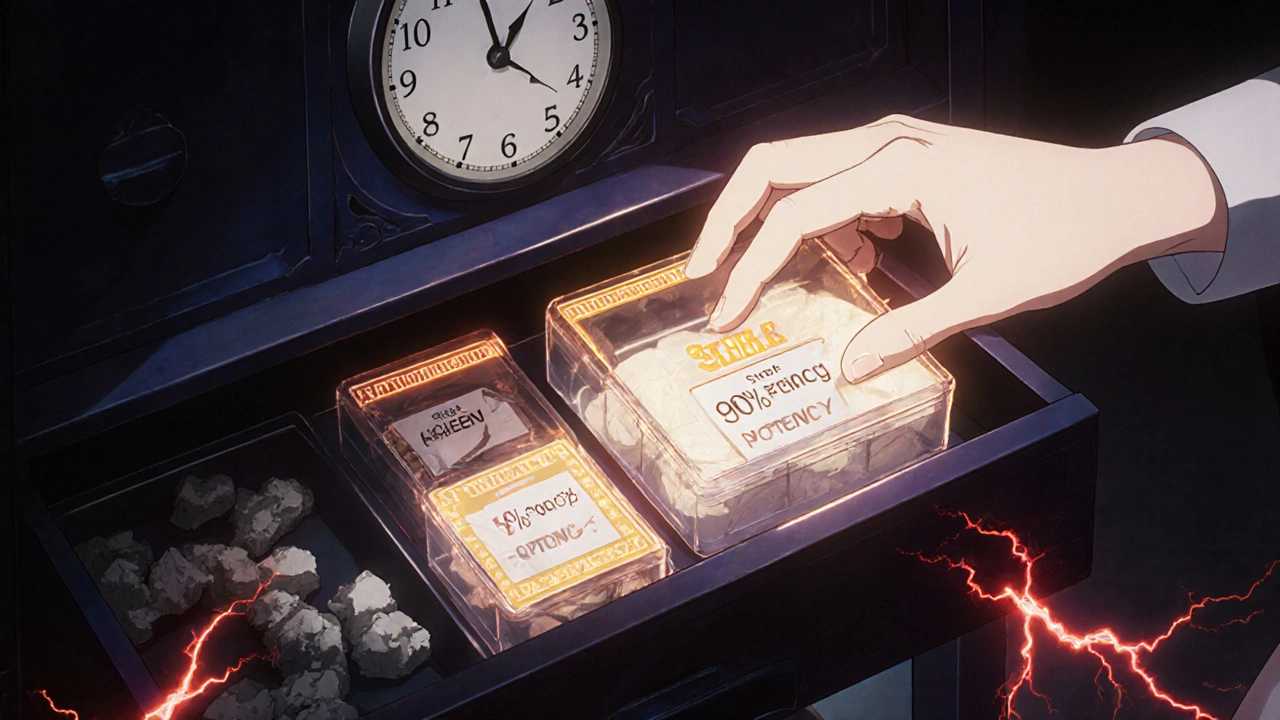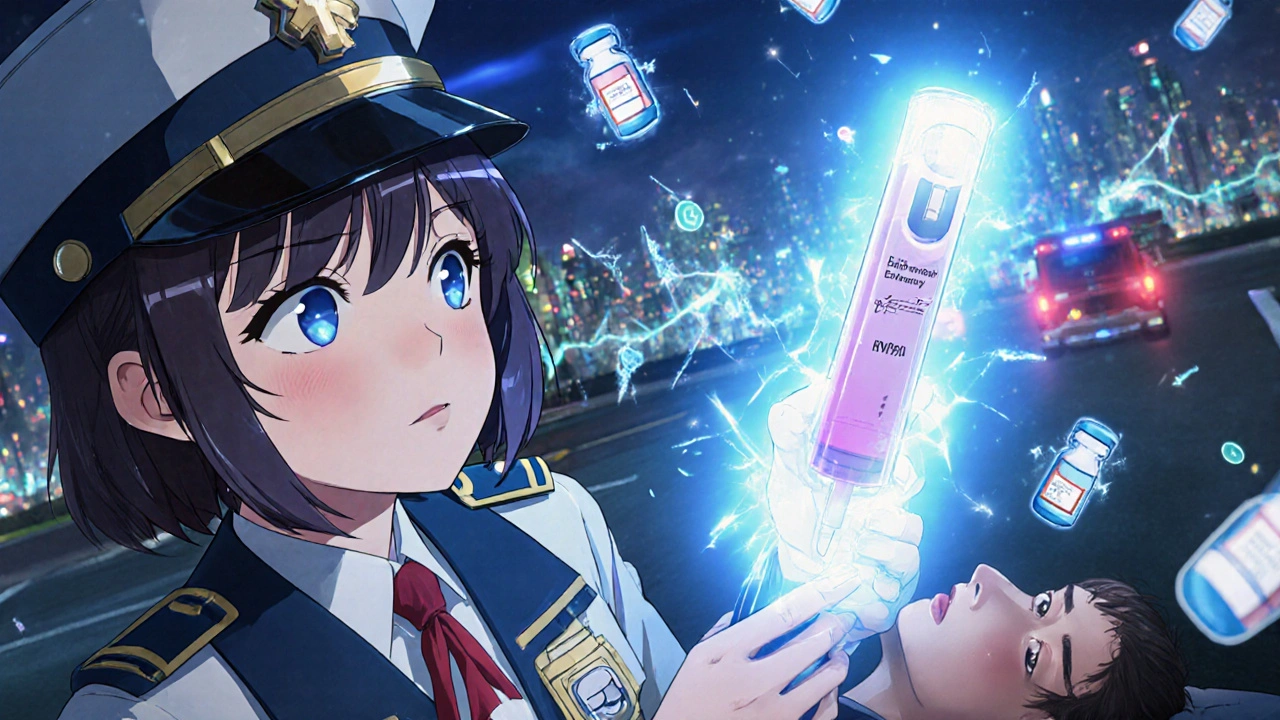Most people throw away expired pills without a second thought. But what if you’re in a remote area, the power’s out, the pharmacy is closed, and the only thing left in your first aid kit is an epinephrine auto-injector that expired six months ago? Do you risk using it-or risk losing someone’s life?
Expiration Dates Aren’t Magic Deadlines
The date printed on your medicine bottle isn’t a cliff edge where the drug suddenly turns toxic. It’s a manufacturer’s guarantee: up to this date, the drug will work as labeled if stored properly. After that? It’s not a legal cutoff-it’s a liability limit. The FDA has been tracking this since 1985 through its Shelf Life Extension Program (SLEP), a joint effort with the Department of Defense. They’ve tested over 100 drugs stored under controlled conditions. The results? About 90% of them still had at least 90% of their original potency 10 to 15 years after expiration. Pharmaceutical companies set conservative dates because they don’t want to be sued if a drug fails. But the science doesn’t back up the fear. Most pills don’t break down into poison. They just get weaker.Not All Medications Are Created Equal
Here’s the hard truth: some expired drugs are fine to use in a pinch. Others could kill you. Low-risk: OTC pain relievers and antihistamines Ibuprofen, acetaminophen, and diphenhydramine (Benadryl) are among the most stable. University of Utah studies show they retain 85-90% potency even 4-5 years past expiration. If you’ve got a headache or allergies and nothing else is available, these are your safest bets. Moderate-risk: Life-critical but not immediately lethal Drugs like warfarin (blood thinner), levothyroxine (thyroid), and seizure meds like phenytoin are trickier. A 10% drop in warfarin potency might mean a clot forms. A 15% drop in seizure meds can trigger a breakthrough seizure. These aren’t safe to use casually-but if you’re stranded with no other option and someone’s life is on the line, they might be your only choice. High-risk: Never use expired These are non-negotiable:- Epinephrine: Loses 25% potency per year after expiration. In anaphylaxis, every milligram counts. A 2023 study from UH Hospitals found expired pens still worked in 78% of cases-but that’s not a guarantee. If you’re using one, you’re gambling.
- Insulin: A 2023 FDA safety alert showed insulin glargine lost 35% potency after just six months past expiration. That’s not a slight drop-it’s a medical emergency waiting to happen.
- Nitroglycerin: This heart medication degrades fast in light and heat. If it’s not crystal clear or smells funny, don’t use it. Even a 10% loss can mean the difference between relief and a heart attack.
- Tetracycline antibiotics: These don’t just weaken-they turn toxic. Expired tetracycline can cause kidney damage.
- Liquid antibiotics: They degrade faster than pills. A 2021 study from the International Pharmaceutical Federation showed liquids lose potency 30-40% faster than solids. A weak antibiotic doesn’t just fail to treat infection-it breeds resistant bacteria.
Storage Matters More Than the Date
A pill stored in a hot bathroom cabinet for five years is not the same as one kept in a cool, dry drawer. Heat, light, and humidity are the real killers. - Tablets stored at 25°C (77°F) and 60% humidity retain 95% potency for 5-10 years past expiration. - The same pill stored at 35°C (95°F) degrades 2-3 times faster. - Nitroglycerin exposed to sunlight loses 15-25% potency per month. - Insulin kept at room temperature for more than a month after opening can lose up to 20% potency per month. The Denver Metro EMS Medical Directors require strict temperature logs for any extended-use medication. If you’re keeping meds for emergencies, store them in a sealed container in a cool, dark place-like a bedroom drawer, not the bathroom.
When Is It Okay to Use Expired Medication?
There’s no blanket rule. But here’s the framework used by EMS agencies and hospitals:- Is there no alternative? If you can drive to a pharmacy or call 911, do that.
- Is it life-threatening? Only use expired meds for conditions that could kill you within minutes-like anaphylaxis, cardiac arrest, or uncontrolled seizure.
- Has it been stored properly? Check for discoloration, crumbling, odd smells, or cloudiness. If it looks wrong, don’t use it.
- Is it a low-risk drug? Stick to ibuprofen, acetaminophen, or antihistamines. Avoid insulin, epinephrine, and antibiotics unless you have no choice.
- Do you have documentation? If you’re an EMS provider, you’re required to log the drug, lot number, expiration date, storage conditions, and patient outcome. For individuals, just know you’re taking a calculated risk.
Real-World Cases: Successes and Failures
In August 2023, a paramedic on Reddit used a 3-month expired EpiPen to treat anaphylaxis. The patient improved within two minutes. They still went to the ER-because you always do-but the expired drug bought critical time. In February 2023, a different case made headlines: a 6-month expired albuterol inhaler failed to relieve severe asthma. The patient needed intubation. The drug wasn’t toxic-it just didn’t work. A 2022 survey by the American Ambulance Association found 43% of EMS providers had used expired meds during shortages. Of those, 89% reported positive outcomes when used for immediate life threats. But 11% didn’t. That’s the gamble.
What’s Changing in 2025?
The FDA is moving slowly but steadily. In April 2023, they released draft guidance proposing standardized extension protocols for 12 critical drugs-like epinephrine, insulin, and albuterol-during declared shortages. The Department of Defense expanded its Shelf Life Extension Program to cover 35 drug classes in January 2024. New tech is helping too. Researchers at the University of Florida are testing portable Raman spectroscopy devices that can scan a pill and tell you its potency in seconds-no lab needed. This could soon be standard in ambulances and disaster response units. But the FDA still warns: “Expiration dates exist for patient safety.” Commissioner Robert Califf isn’t backing down. He’s right to be cautious. But so are the paramedics who’ve used expired epinephrine and saved lives.What You Should Do Now
If you’re preparing for emergencies:- Keep a small stash of ibuprofen, acetaminophen, and diphenhydramine. They’re stable, safe, and useful.
- Store them in a cool, dark place. Use airtight containers.
- Don’t stockpile insulin, epinephrine, or antibiotics unless you’re trained and have a plan.
- If you’re a caregiver for someone with chronic conditions, know their meds’ expiration dates and replace them before they expire.
- Check your local EMS agency’s policy. Many now have written protocols for expired meds during shortages.
Bottom Line
Expired meds aren’t poison. Most are just weaker. In a true emergency-with no alternatives, proper storage, and a low-risk drug-they can be a lifeline. But they’re not a backup plan. They’re a last resort. Don’t use expired insulin. Don’t use expired epinephrine unless you’re out of options. Don’t use expired antibiotics. But if you’re stranded with a headache and only expired Tylenol? It’s probably fine. The goal isn’t to encourage recklessness. It’s to replace fear with facts. In medicine, sometimes the best choice isn’t perfect-it’s the only one left.Is it dangerous to take expired medication?
Most expired medications don’t become toxic-they just lose potency. The exception is tetracycline antibiotics, which can turn harmful. For most pills like ibuprofen or acetaminophen, the main risk is that they won’t work as well. For life-saving drugs like insulin or epinephrine, reduced potency can be deadly.
How long after expiration can you safely use medicine?
It depends on the drug and how it was stored. Solid pills like pain relievers often remain effective 5-10 years past expiration if kept cool and dry. Liquids, insulin, and epinephrine degrade much faster-sometimes within months. The FDA’s Shelf Life Extension Program found 90% of tested drugs retained 90% potency up to 15 years after expiration under ideal conditions.
Can expired medications cause antibiotic resistance?
Yes. If an expired antibiotic is no longer potent enough to kill all the bacteria, it can leave behind the strongest strains. These surviving bacteria multiply and become resistant. That’s why using expired antibiotics-even if they seem to work-is risky and discouraged unless absolutely necessary.
Should I keep expired epinephrine in my emergency kit?
Only if you have no other option. Epinephrine loses 25% potency per year after expiration. While some studies show expired pens still work in 78% of anaphylaxis cases, you’re gambling with a life. Replace it on schedule. If you must use an expired one, do so only in a life-threatening situation with no alternatives-and get emergency help immediately after.
How do I know if an expired medication is still good?
Check for visible signs of degradation: discoloration, crumbling, unusual odor, or cloudiness (for liquids). If it looks or smells off, don’t use it. For critical drugs like insulin or epinephrine, visual inspection isn’t enough-potency loss can’t be seen. If you’re not trained, don’t guess. Replace them.
Are there any legal risks to using expired medication in an emergency?
For individuals using expired meds in a true emergency with no alternatives, legal liability is extremely rare. For EMS providers and hospitals, using expired drugs requires documented protocols and approval from medical directors. Many agencies now have formal policies allowing it during shortages, with strict documentation requirements.
What should I do if I accidentally take expired medication?
If it’s a pain reliever or antihistamine and you feel fine, you’re likely okay-just replace it. If it’s a critical drug like insulin, epinephrine, or an antibiotic, monitor for symptoms. If the condition it was meant to treat returns or worsens, seek medical help immediately. Don’t assume it worked just because you didn’t feel worse.
Can I extend the expiration date of my medications?
You can’t legally change the expiration date on the label. But in emergencies, trained professionals (like EMS or hospital pharmacists) can extend use under approved protocols-based on storage history, visual inspection, and drug type. For individuals, the best practice is to replace medications before they expire, not to guess how long they’ll last.





steffi walsh
Just saved my mom’s life last winter with a 2-year-old EpiPen when her throat closed up and the pharmacy was 40 miles away. She’s fine now. Don’t let fear paralyze you when the alternative is death. Science says it works more often than not. Trust the data, not the label.
Conor McNamara
they’ve been hiding this for decades… the pharmas dont want you to know you dont need to keep buying new ones… i saw a doc on youtube where they tested 15 year old pills and they were still 94% strong… the gov and big pharma are in bed together… dont trust the expiration date… its a scam
Leilani O'Neill
How quaint. An Irishman using expired epinephrine like it’s a folk remedy. In proper medical jurisdictions, we have protocols, trained personnel, and regulated supply chains. This isn’t a survivalist podcast-it’s medicine. Your casual disregard for pharmaceutical standards is not bravery. It’s negligence dressed up as pragmatism.
Riohlo (Or Rio) Marie
Oh darling, let’s not pretend this isn’t just capitalism repackaged as caution. The FDA doesn’t care if your insulin works-they care if they can sue you when it doesn’t. The real tragedy? People die because they can’t afford replacements, not because expired meds are dangerous. But no, let’s keep blaming the patient for not buying new vials every six months while the stock price climbs. How poetic.
Brenda Kuter
They’re lying to us. The government and Big Pharma are hiding the truth. I read on a forum that expired insulin is being used in FEMA camps to control the population-lower potency means more dependency, more visits, more data collection. You think that’s a coincidence? Look at the timeline. Right after the pandemic, they started pushing ‘replace every 6 months’ harder than ever. I’m not taking any risks. I’m keeping my 3-year-old epinephrine. And I’m not alone.
Shaun Barratt
While the empirical data presented in the FDA’s SLEP program is compelling, the distinction between statistical likelihood and clinical certainty remains paramount. A 90% potency retention rate does not equate to therapeutic equivalence in acute, life-threatening scenarios. The variance in individual pharmacokinetics, storage conditions, and degradation kinetics precludes generalization. Clinical practice must prioritize verifiable, documented efficacy over probabilistic extrapolation.
Iska Ede
So let me get this straight-you’re telling me I should risk my kid’s life because I’m too lazy to replace a $50 EpiPen? Wow. That’s not bravery. That’s just being cheap with a side of delusion. Next you’ll say ‘my expired Tylenol is fine’ and then cry when your headache turns into liver failure. Grow up.
Gabriella Jayne Bosticco
I work in rural EMS. We’ve used expired meds in 12 different emergencies over the last 3 years. Three times, they worked perfectly. One time, an old albuterol didn’t help-so we used a nebulizer instead. We always document it. We never pretend it’s ideal. But we also don’t let a printed date kill someone because we’re too afraid to act. There’s a difference between recklessness and responsibility. This post nails it.
Katelyn Sykes
My grandma kept all her meds in a drawer for 10 years. She used expired ibuprofen for her arthritis and never had an issue. But she’d never touch insulin or antibiotics. She knew the difference. Don’t overthink it. Know your meds. Store them right. Use common sense. The body knows when something’s off. If it looks weird or doesn’t work-stop. But don’t throw away your Tylenol just because the date passed. Seriously. Chill.
Bailey Sheppard
Thanks for this. I’ve been scared to even look at my expired epinephrine since my cousin’s bad reaction. But hearing the real data and the EMS stories helps. I’m not gonna use it unless I have to-but now I understand why some people do. And I’m gonna start storing my meds in a shoebox in my closet instead of the bathroom. Small change, big difference.